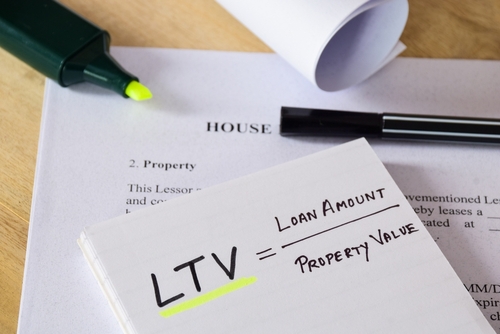The Role of Loan-to-Value (LTV) Ratio in Hard Money Lending
Are you considering using a hard money loan to finance an investment property? Whether you’re looking to fix and flip a run-down property or buy a rental home, a hard money loan could be a viable financing option. Unlike traditional lending institutions, which look at your creditworthiness to determine a loan amount, hard money lenders will evaluate the property you use as collateral. Therefore, knowing the loan-to-value ratio is crucial. Today, we’ll go over the role of LTV in hard money lending, how to calculate it, and what constitutes a good LTV ratio.

Contents of This Article:
- What Is the Loan-to-Value Ratio?
- Role of LTV in Hard Money Lending
- What Is a Good Loan-to-Value Ratio?
- Check Your Lender’s Requirements Today
What Is the Loan-to-Value Ratio?
The loan-to-value (LTV) ratio is a crucial concept in the realm of hard money lending. Unlike traditional loans, where a borrower’s creditworthiness is essential, hard money lending is predominantly secured by the value of the underlying asset, typically real estate. As such, understanding the LTV ratio is crucial for both borrowers and lenders as it shapes the terms, risk assessment, and conditions of hard money lending transactions.
Ultimately, the LTV ratio of a hard money loan represents how much money the lender is willing to provide compared to the value of the property being used as collateral. If you’re looking at hard money loans in Baltimore, Maryland, it’s important to know how to calculate the LTV ratio.
Calculating the loan-to-value ratio is quite simple. All you need to do is find the total amount borrowed against an asset and divide it by the appraised value of the property being financed. Your calculation should look like this:
- LTV = Loan Amount / Appraised Value of the Property x 100
For instance, if a hard money lender offers a loan of $70,000 for a property that’s appraised at $100,000, the LTV ratio would be 70%. That means the lender provides 70% of the property’s appraised value.
Role of LTV in Hard Money Lending
The loan-to-value (LTV) ratio plays a crucial role in determining the terms and conditions of a hard money loan. It’s so important for hard money lenders to assess the LTV ratio because it helps them gauge the amount of risk they’re taking. That said, here are more of its major roles in hard money lending.

- Maximum Loan Amount
- Loan Terms and Interest Rates
- Exit Strategy Considerations
- Quick Approval and Funding
- Risk Mitigation
Maximum Loan Amount
Hard money lenders often set a maximum LTV ratio. They are usually willing to lend a percentage of the property’s value, typically ranging from 50% to 70% or higher. This means borrowers need to bring a significant amount of their own funds as a down payment.
Loan Terms and Interest Rates
The LTV ratio can influence the interest rate and terms of the loan. A borrower with a lower LTV might qualify for a lower interest rate and more favorable terms, as they represent a lower risk to the lender.
Exit Strategy Considerations
Hard money lenders are primarily concerned with the property’s value and the borrower’s exit strategy, or how they plan to repay the loan. That said, the LTV ratio is a crucial factor in evaluating the feasibility of the exit strategy. If the borrower plans to sell the property, a higher LTV might be acceptable since the sale would provide the funds to repay the loan.
Quick Approval and Funding
Hard money loans are known for their speed and flexibility. Since the loan is primarily secured by the property’s value, lenders can process and approve loans faster than traditional banks. The LTV ratio helps streamline this process as the property’s value can be assessed relatively quickly.
Risk Mitigation
For hard money lenders, the primary protection against default is the equity in the property. As such, a lower LTV ratio provides a larger buffer against potential market fluctuations or unforeseen circumstances that could affect the property’s value.
What Is a Good Loan-to-Value Ratio?
A “good” loan-to-value ratio for a hard money loan depends on several factors, like the lender’s policies, the property type, and the borrower’s situation. However, loan assessments with high LTV ratios are considered to be higher-risk loans. Hard money lenders typically prefer lower LTV ratios because they offer a larger cushion of equity, reducing the lender’s risk in case of default.

In hard money lending, LTV ratios can vary widely depending on the lender’s policies and the specifics of the loan. However, they often range from 50% to 70% or even higher but tend to be lower than typical mortgage loans.
Aside from the LTV ratio, lenders also look at several other factors. For instance, they’ll also evaluate the property type, the borrower’s experience and creditworthiness, and their exit strategy. Some hard money lenders may be willing to offer higher LTV ratios to experienced investors with a strong track record of successful projects.
Also, lenders are often concerned with the borrower’s loan repayment plan. If their exit strategy is well-thought-out and highly likely to succeed, a lender may be more flexible with the LTV.
However, hard money loans have no universal “good” LTV ratio. Discussing your situation with potential lenders is important, as most policies and preferences vary.
Check Your Lender’s Requirements Today
If you’re looking to finance a new investment property with a hard money loan, you’ll want to start by finding local lenders. Then, you can compare rates, terms, and conditions to find one that works best for you and your investment strategy. Whether you’re looking at a fix-and-flip project, rental investment, or bridge financing, it’s important to work with a local lender that meets your needs.
Maryland Hard Money Lenders is an excellent option for those looking to finance real estate near the Baltimore area. We offer several loan types, whether it’s a rehab, property flip, cash-out refinancing, investment properties, or rental investments. So, if you want to learn more about our lending process or fill out an initial loan application, contact MHML today!



